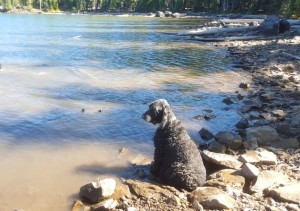I’d been pushing too hard for too long and the day was too nice. I closed my computer and piled the dogs in the car for a hike. Our destination: a trailhead where we’d find a lake after an easy mile and a half and another lake a mile and a half after that.
From the moment we started up the winding dirt trail, my pups scampered under and over logs that lay like pick-up sticks on either side of us, sprinted ahead after critters, returned to check on me and took off again, sniffing the air as they explored their new surroundings. Hoover, my blind guy, and I ambled along, a slight tug on the harness alerting him to tread carefully or lift his paws over a rock or root. An occasional ray of sun peeking through the gangly pines warmed the cool air that hugged my bare arms. The silence seemed like a healing gift.
About half way to the first lake, I suddenly noticed that the trees were now draped with lichen shawls. They hadn’t been when we started out. When had that changed? And what else hadn’t I noticed?
 So I began to look around. I realized that the previously dusty trail was now covered with a carpet of small, rusty pine needles. I saw how the patches of sun breaking through the dense forest danced on the ground, spotlighting small plants that looked like they belonged in Hawaii rather than Central Oregon. I studied the rivulets of grey-brown bark on the trees, and tiny flowers, the last of the season, growing in the cracks of rounded gray-white boulders. I listened to the trees creak like worn barn doors as they rubbed together. And I watched my pups frantically wag their tails over discoveries that I had completely overlooked, only to wag even faster once they splashed into the icy mountain lake.
So I began to look around. I realized that the previously dusty trail was now covered with a carpet of small, rusty pine needles. I saw how the patches of sun breaking through the dense forest danced on the ground, spotlighting small plants that looked like they belonged in Hawaii rather than Central Oregon. I studied the rivulets of grey-brown bark on the trees, and tiny flowers, the last of the season, growing in the cracks of rounded gray-white boulders. I listened to the trees creak like worn barn doors as they rubbed together. And I watched my pups frantically wag their tails over discoveries that I had completely overlooked, only to wag even faster once they splashed into the icy mountain lake.
What’s when it hit me. If you don’t turn on that detail-observation switch that we all have inside, you’ll never notice the intricate textures of sight, sound and smell that surround us all the time. As writers, however, we need to pay close attention to that since detail brings our writing to life, allowing the reader to experience the world we’ve created instead of just being told about it.
So I challenge you to turn on your writing detail-observation switch. Take yourself for a walk, or a trip to the store or the car wash, or out to lunch. Or just sit in your home or your backyard. But instead of taking in the scene at a glance, really look, listen and smell this time. Note every detail you can, from a squished bug or cigarette butt to the bus boy who clears your table, until you have fully absorbed every detail around you. Then write up a sloppy letter about that bit of the world you experienced during those moments, incorporating as much detail as you can possibly squeeze in. And you’ll realize that when it comes to writing detail, the eye of the writer makes all the difference.



Sorry, comments are closed for this post.